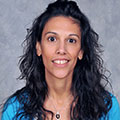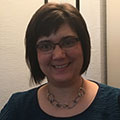As you go through your grad school search, you'll probably find yourself doubting if grad school or a certain program is right for you. It’s likely you’ll want to pick the brain of a current grad student to really understand what the experience is like and what you may expect. Don't worry—we did it for you! Here are three student stories to help you get a better feel for advanced degree programs.
 Marisa Castronova-Wos
Marisa Castronova-Wos
School: Caldwell University in Caldwell, New Jersey
Degree program: PhD in Educational Leadership (K-12)
Why did you choose to go to grad school?
Stated simply, I am just one of those people who love to learn. Academia has always been like a second home, where I gain personal satisfaction in challenging myself to explore different interests. After my 10th year in the teaching profession, I decided I was ready for another challenge. Pursuing a doctoral degree was the logical next step. I knew this experience would afford me the opportunity to leave my mark on the educational community by conducting my own independent research.
How did you find the right program for you?
I looked for a program that would allow me to balance my full-time teaching career and two pre-school-aged children—and still let me keep a bit of sanity. As I researched several options, Caldwell University stood out above the rest. The weekend course schedule, accelerated pace, and support from a close-knit academic community made it the right choice. It left me feeling that the journey was doable and support was always within reach.
How does it compare to your undergrad experience?
In pursuing a doctoral degree, you quickly learn that there isn’t a lot of hand-holding, and your path from start to finish isn’t as clearly mapped out. Instead, you are at the helm steering your own ship. My undergraduate experience refined my self-discipline and gave me the ability to become a more reflective thinker. These qualities have become immensely important as I continue to navigate my graduate experience.
What has been the most challenging or surprising?
Prior to the program, I sought to be the best educator within my own classroom. However, as I continue on through the program, I find myself taking on a global perspective toward education, feeling inspired to create change beyond the four walls of my classroom. And one of the best moments was turning a casual conversation with a fellow member of my cohort into a grant-funded STEM opportunity for students.
What advice can you offer other (would-be) graduate students?
Pursuing a higher degree is one of the most valuable gifts you can give yourself. Treat it as an investment and expect to get out as much as you are willing to put in. When times get tough, remember that your journey isn’t totally in isolation. Surround yourself with support from fellow classmates who know what it’s like to walk in your shoes.
Related: Great Graduate Schools and Programs in the Northeast
 Bruno Orlandini
Bruno Orlandini
School: Sacred Heart University in Fairfield, Connecticut
Degree program: Master of Finance and Investment Management
Why did you choose to go to grad school?
I always dreamed of working in investment banking, but as we all know this industry is extremely competitive. I also knew that with an undergrad degree from a small school in South Carolina and limited work experience, my odds were not favorable and that it would be very hard to compete against Ivy League graduates. Therefore, I decided that going to grad school was my best option in order to further develop my education and better position myself in the job market—and I was right about it. I already received a full-time offer from a well-known investment bank, and I will be soon starting my dream job.
How did you find the right program for you?
I was looking for a program where I would learn best practices on theoretical knowledge (CFA track), gain practical and applied exercises that reflect real-life situations (Bloomberg, Cap IQ, etc.), and be close enough to New York City and major hedge funds to get exposure to the field. On top of that, the Master of Finance and Investment Management at Sacred Heart is classified as a STEM course and provides all foreign students (I’m originally from Araraquara in Sao Paulo, Brazil) an extended work opportunity upon graduation.
How does it compare to your undergrad experience?
I believe grad students are more mature and willing to learn and share their experiences. A very positive aspect of my graduate experience is that I am always learning, not only from the professors but also from other students who have different experiences and backgrounds. Also, grad school emphasizes the underlying thinking rather than getting the correct answer by itself. In other words, at the end of the day, you will probably forget a formula you have learned—but you won’t forget the thinking process behind it.
What advice can you offer other (would-be) graduate students?
My advice to other graduate students would be to work hard, be organized, and most importantly interact with other people. Students will be surprised when they realize how much they can learn inside and outside the classroom simply by leaving their comfort zone and looking for different experiences. I’ve learned a lot by interacting with people who have different beliefs, values, and backgrounds. So perhaps my main advice is simply don’t be shy!
 Laura Shinkunas
Laura Shinkunas
School: Creighton University in Omaha, Nebraska
Degree program: Master of Science in Health Care Ethics
Why did you choose to go to grad school?
When I applied for grad school, I had worked in a bioethics and humanities program for about eight years. At that point, I felt like it was important for me to continue my education in order to further my career.
How did you find the right program for you?
The length of time it would take to complete the program was an important consideration for me. Creighton’s program offered eight-week long classes, which allowed me to take one class at a time and obtain my graduate degree in 18 months. This was half the time of other programs I had considered. Creighton also offered a variety of classes that blended well with the range of roles I am asked to perform in my current position.
How does it compare to your undergrad experience?
Graduate school has been much more demanding and time consuming. I found that I cannot procrastinate! However, the material in grad school has been directly applicable to my job, which has made the whole experience more rewarding and engaging.
What has been the most challenging or surprising?
I was surprised at how personally fulfilling the whole experience could be and how much I grew as a writer.
What advice can you offer other (would-be) graduate students?
Graduate school is a wonderfully rewarding experience. However, it is also a lot of work. In order to be a successful graduate student, you need to be dedicated and stay on top of your assignments.
Related: Great Graduate Schools and Programs in the Midwest and West
We hope these student stories have helped you get a clearer picture of what grad school may be like for you and how you can find the right program for your goals and aspirations. Grad school is a huge step, so you need to be sure it’s the right decision for you. But if you do decide to apply, do so with confidence and the knowledge you’re doing something great for your future.
Explore more grad schools across the country that could be a great fit for you using our Graduate Program Search tool.







